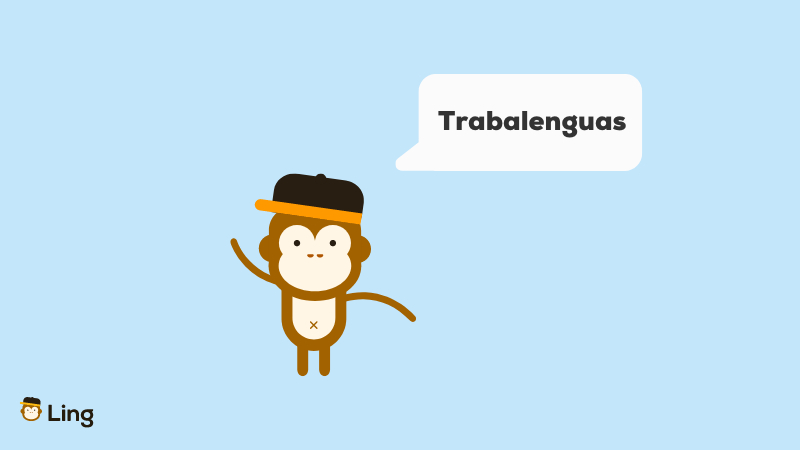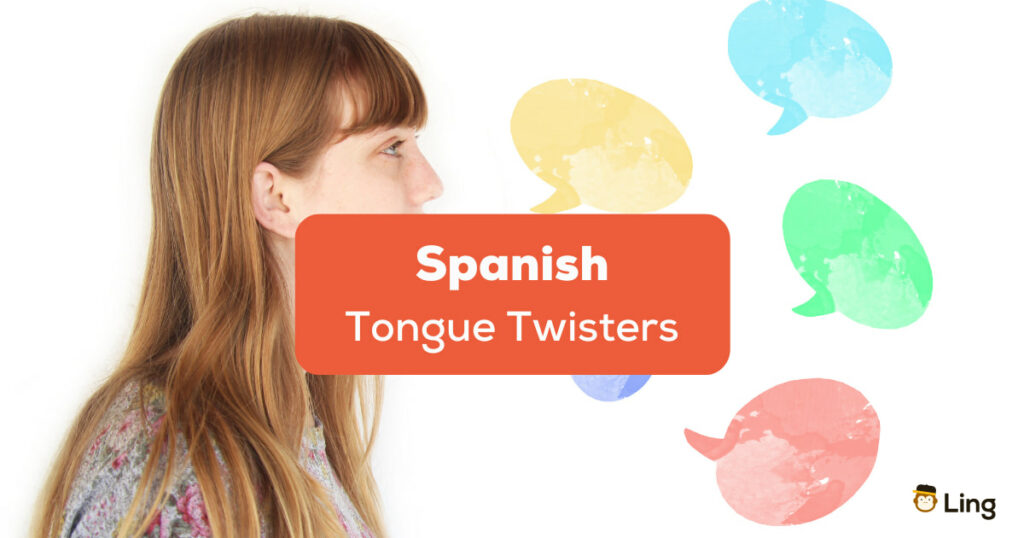Do you find it difficult to pronounce certain words in Spanish, and have you begun to feel discouraged for not being able to improve? Don’t worry. I have the perfect tool for you to increase your skills. Spanish Tongue Twisters are one of the best and most effective tools when it comes to learning pronunciation. In addition to being a dynamic and fun exercise, if you constantly practice, it can give you excellent results in a short time.
In this blog, you will learn about Spanish pronunciation, what tongue twisters are for, and how to use them. I will share a list of fabulous Spanish tongue twisters that you can use to start your practice today.
Let’s get started!
Facts About Spanish Pronunciation
A Spanish teacher once explained that Spanish is not as complicated to pronounce as other languages. It is because it is a phonetic language. A letter corresponds to a specific sound.
The real difficulty comes to foreigners whose languages have different phonetics. For them, imitating a native speaker takes more time than for those who are familiar with specific sounds.
On the other hand, in Spanish, accents create stress in specific syllables and help us pronounce the words to know their meaning. If you do not use the tilde or accent mark in a word, you may completely change its meaning. For example, see the terms ‘papá’ and ‘papa.’ ‘Papá’ with an accent mark means father. Meanwhile, ‘papa’ without an accent means potato.
Several words in Spanish are very similar to each other, and it takes a lot of practice speaking with native speakers to discern them in a conversation.
After knowing these little details of the pronunciation of the Spanish language, you may think that it will be difficult for you to achieve it, but it is not like that! I assure you that you will achieve it with practice, positivity, and determination.

What Are Tongue Twisters Used For?
Tongue twisters are a fun and engaging way to practice the pronunciation of a native or new language. Usually used in schools for child-like games, they can also be used by teenagers and adults.
They are long or short phrases that emphasize the sound of each word in different difficulty levels to allow your tongue to practice pronunciation.
An important thing to know about these sentences is that you shouldn’t waste your time trying to understand the meaning of the words or phrases. Put your attention on learning how to pronounce and increase speed while saying the phrases aloud.
The meanings of the tongue twisters don’t make sense, and they do not matter for this specific goal of learning the correct Spanish pronunciations.

How To Leverage Tongue Twisters To Practice Spanish Pronunciation
If you are a Spanish professor, teaching Spanish tongue twisters to your students will bring interactivity to your classroom. They will be entertained trying to pronounce them right. Soon, you will notice a lot of improvement in them! Not only in pronunciation but also in shyness while speaking out loud.
But of course, always provide them with tongue twisters suitable for their level; otherwise, they might get discouraged if they can’t pronounce them!
If you are a Spanish language learner, you should start with the easiest ones with low speed to make the best out of tongue twisters. Slowly pronounce them until you get familiar with the sounds of each word of the sentence.
As you see improvement, you can start to speed up the pronunciation and then continue with more complex sentences as time goes by.
It is a process of repeating and practicing many times a single sentence. So you will need to have some patience. However, tongue twisters promise to be quite fun to play with, so you will not get bored fast!
The trick is challenging yourself to achieve more. Even rewarding yourself after pronouncing one will be beneficial for your experience.

What Is The Term For ‘Tongue Twister’ In Spanish?
Trabalenguas
Traba (block) + Lenguas (Tongues)
I’ve heard some people say as a joke ‘se te va a trabar la lengua con estas frases’ (your tongue will get stuck with these phrases.) Because it is indeed what happens when trying to say them fast!
Are you ready to find out if you can read them all?
23 Fun Spanish Tongue Twisters To Practice Your Pronunciation
Here are the most known trabalenguas that native speakers have said or heard at least once. I will add all tongue twisters in order of difficulty, from the easiest to the hardest.
In addition, there will be an English translation next to every Spanish tongue twister, for you to have a better idea of what you are saying. But as previously mentioned, these phrases aren’t meant to be understood in any context. So, of course, the translations may not make sense at all.
- Tres tristes tigres tragaban trigo en un trigal.
- (Three sad tigers swallowed wheat in a wheat field.)
- Un perro rompe la rama del árbol.
- (A dog breaks the tree branch.)
- Juan junta juncos junto a la zanja.
- (Juan gathers rushes by the ditch.)
- Como poco coco como, poco coco compro.
- (I eat little coconut I eat, little coconut I buy.)
- La sucia Susana ensucia suficientemente el suéter de Sonia.
- (Dirty Susana makes Sonia’s sweater dirty enough.)
- Hoy ya es ayer y ayer ya es hoy, ya llegó el día, y hoy es hoy.
- (Today is yesterday and yesterday is Today, the day has come, and Today is Today.)
- Baza, come calabaza. Baza, calza zapatas y come calabazas.
- (Baza, eat pumpkin. Baza, wears shoes and eats pumpkins.)
- El perro de Rita me irrita dile a Rita que cambie el perro por una perrita.
- (Rita’s dog irritates me, tell Rita to change the dog for a female dog.)
- Si Pancha plancha con 4 planchas, ¿con cuántas planchas plancha Pancha?
- (If Pancha irons with 4 irons, how many irons does Pancha iron?)
- Buscaba en el bosque Francisco, un vasco bizco, muy brusco, y al verlo le dijo un chusco, ¿Busca el bosque, vasco bizco?
- (Francisco was looking at the forest, a very abrupt cross-eyed Basque. When he saw him, he said as a joke, are you looking for the forest, cross-eyed Basque?)
- Compré pocas copas, pocas copas compré y como compré pocas copas, pocas copas pagué.

- Un ave pensaba mientras que volaba, que sentía el pez mientras que nadaba. Y pensaba un pez mientras que nadaba, que sentía el ave mientras que volaba.
- (A bird thought as it flew what the fish felt as it swam. And he thought of a fish while swimming, what the bird felt while flying.)
- La sucesión sucesiva de sucesos sucede sucesivamente con la sucesión del tiempo.
- (The successive succession of events happens successively with the succession of time.)
- Pablito clavó un clavito, ¿qué clavito clavó Pablito?, el clavito que Pablito clavó, era el clavito de Pablito.
- (Pablito nailed a little nail. What little nail did Pablito nail? The little nail that Pablito nailed was Pablito’s little nail.)
- Erre con erre cigarro, erre con erre barril, rápido corren los carros cargados de azúcar al ferrocarril.
- (Erre with erre cigarette, erre with erre barrel, the carts loaded with sugar quickly run to the railroad. Erre refers to the sound of the vowel ‘rr’ – double r, which is often a difficult sound for foreigners to make.)
- Esteban es escalador escala y escala, Esteban el escalador, de tanto escalar, en una cima quedó.
- (Esteban is a climber, scale and scale. Esteban, the climber, ended up on a peak from climbing so much.)
- Tengo una gallina pinta pipiripinta gorda pipirigorda pipiripintiva y sorda que tiene tres pollitos pintos pipiripintos gordos pipirigordos pipiripintivos y sordos. Si la gallina no hubiera sido pinta pipiripinta gorda pipirigorda pipiripintiva y sorda Los pollitos no hubieran sido pintos pipiripintos gordos pipirigordos pipiripintivos y sordos.
- (I have a fat pipiripinta pipiripinta fat pipiripintiva and deaf hen that has three fat pipiripinto pinto pipiripinto deaf chicks. If the hen had not been pinto pipiripinta fat pipirigorda pipiripintiva and deaf The chicks would not have been pinto pipiripinto fat pipirigordos pipiripintivo and deaf.)
- Un dragón tragón tragó carbón y el carbón que tragó el dragón tragón le hizo salir barrigón.
- (A gulping dragon swallowed coal, and the coal that the gulping dragon swallowed made him come out paunchy.)
- Cuando cuentes cuentos, cuenta cuantos cuentos cuentas. Porque si no cuentas cuantos cuentos cuentas, nunca sabrás cuantos cuentos cuentas.
- (When telling stories, count how many stories you tell. Because if you don’t tell how many stories you tell, you’ll never know how many stories you tell.)
- Tengo un durazno muy desduraznador, el que me lo desdurazne, será un gran desduraznador.
- (I have a very peachy peach. If you give me a peach, it will be a great peachy peach.)
- Un zapatero zambo, zapateaba zapateados de zapata, de zapata zapateaba zapateados un zapatero zambo.
- (A zambo cobbler, tapped zapateados de zapata, de zapatea tapped a zambo shoemaker.)
- El cielo está enladrillado. ¿Quién lo desenladrillará? El desenladrillador que lo desenladrille, un buen desenladrillador será.
- (The sky is brick. Who will unbrick it? The unbrickman who unbricks it, a good unbrickman will be.)
And finally, I present you the boss of all Spanish Tongue twisters that not even I can say:
- El otorrinolaringólogo de parangaricutirimicuaro, se quiere desotorrinolaringaparangaricutirimicuarizar, el desotorrinolaringaparangaricutimicuador que logre desotorrinolaringaparangaricutimicuarizarlo, buen desotorrinolaringaparangaricutimicuador será.
- (The otolaryngologist of parangaricutirimicuaro wants to deotorhinolaryngaparangaricutimicuarize, the deotorhinolaryngaparangaricutimicuador who achieves deotolaryngaparangaricutimicuaro will be a good deotolaryngaparangaricutimicuador.)
Master Your Spanish Pronunciation Skills
These Spanish tongue twisters are ideal for you who are looking to improve your Spanish pronunciation.
Depending on the language, it will always be difficult for us to pronounce certain words because some letters will have a phonetic very different from what we are used to. If this is your case, don’t worry. It is possible for you to pronounce those words that are time-consuming.
First of all, you should know that the pronunciation in Spanish is not as strict as in other languages. We native speakers will always understand that another person is learning and that, therefore, their pronunciation will not be perfect. We also understand that in Spain and Latin America there are different accents.
So don’t worry! Make your Spanish learning more fun without stressing about pronunciation. Listen to TV series or movies, speak with native Spanish speakers, and practice pronouncing words and tongue twisters in Spanish in front of a mirror.

Learn Spanish With Ling App!
In addition to paying attention to your skills in pronouncing the Spanish language, you can continue your practice of vocabulary, grammar, and listening skills.
Learn about food, verbs, adjectives, emergency phrases, and proverbs to build useful vocabulary for your daily conversations.
Ling app can be your companion wherever you go. At any time of your day, you can have at your fingertips several exciting lessons that will teach you what you need to know to communicate with native Spanish speakers.
With Ling app, many people, including me, have learned different languages (out of 60+ available!) with excellent results. If you are afraid to go out into the world and speak Spanish, don’t worry. Ling will help you have that confidence you need.
You are just a click away from achieving your desired Spanish level. Download the Ling app today on the Play Store or App Store, and start your journey today!



































































